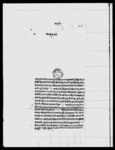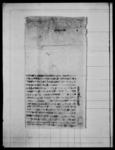A lālamohara from King Rājendra appointing Durgā Siṃ as a ḍiṭṭhā and outlining his responsibilities with regard to Matsyendranātha (VS 1895)
ID: DNA_0014_0106
Edited and
translated by Manik Bajracharya and Rajendra Shakya
in collaboration with
Pabitra Bajracharya
Created: 2021-06-02;
Last modified: 2023-04-03
For the metadata of the document, click here
The accompanying edition, translation/synopsis and/or commentary are available under the terms of the Creative Commons Attribution-ShareAlike 4.0 International License
Abstract
This lālamohara issued by King Rājendra appoints Durgā Siṃ as a ḍiṭṭhā and instructs him to collect the revenue on various lands and other property of Matsyendranātha and deposit it in the deity's treasury. It also directs him to use surplus income to make a silver gate and a throne at the temple of the deity.Diplomatic edition
[1r]
1श्रीदूर्गा \ 1श्रीमछिन्द्रनाथ:2१1 [Royal seal with the legend: श्रीदुर्गाभवानि]1४९८1स्वस्तिश्रीगिरिराजचक्रचूडामणिनरनारायणत्यादिविविधविरूदा
2वलिविराजमानमानोन्नतश्रीमन्महाराजधीराजश्रीश्रीश्रीराजेन्द्र
3विक्रमसाहवाहादूरसम्सेरजङ्देवानांसदासमरविजयिनाम्
4आगे∙दुर्गासिंके¯ ¯१¯ ¯कावाधाविर्ताषेतवारिकोवालिर∙मालम
5त्ताजोभय़ाकोनगदजिनिस्∙ङाषाचोक्कोविसेट्जना६ईषालषु
6कोविसेट्जना६वहिदारजैसिराषि∙अघिभयाकोथितिकामोहर
7वमोजिम्पर्वपर्वकोकामचलाई∙वाकिरह्याकोजोछ∙अघिअघि
8भय़ाकाडिठारउन्काकारोवारिरकमिऔमोहिअसामिगैह्रकोव
9हिवुझि∙तिनवाटउठ्याकारुपैया¯ ¯१¯ ¯काभंडारदाषिलगरिर
10सिदलिनु:अवउप्रान्तवर्षप्रतिउठ्याकाआमदनिलेषर्चभैवाकि
11रह्याकाजगिरालेवर्ष२मा¯ ¯१¯ ¯कोदेव़ल्माचाँदिकोढोकाव
12नाउनु∙वर्ष३मासिंहासनवनाउनु∙वर्ष५कोवट्करारगरि∙किर्ति
13मान्कानाव़कोमोहरहानि∙तलाईमोहरगरिवक्स्यौ∙आफ्नाषा
14तिर्ज्मासग∙अघिअघिभैआयाकारितिथितिवमोजिम्कोका
15मचलाई∙अघिभयाकाडिठालेषायावमोजीम्षानगिषाई¯ ¯१¯ ¯
16कोटहल्सोझोचिताईकाम्गर∙इतिसम्वत्१८९५सालमिति
17माघसुदि४रोज७शुभम्∙¯¯¯ ¯¯¯ ¯¯¯ ¯¯¯ ¯¯¯ ¯¯¯ ¯¯¯ ¯¯¯
[1v]
1(४९)1५२८1मार्फत्पुष्करसाह:Translation
[1r]
Śrī Durgā
Śrī Matsyendranātha (text: Machindranātha) - 1
[Royal seal with the legend: Śrī Durgā Bhavāni]
4981
Hail! [A decree] of him who is shining with manifold rows of eulogy [such as] 'The venerable crest-jewel of the multitude of mountain kings' and Naranārāyaṇa (an epithet of Kṛṣṇa) etc., high in honour, the venerable supreme king of great kings, the thrice venerable great king, Rājendra Vikrama Sāha, the brave swordsman, the divine king always triumphant in war
[Collect all] crops [due] on the paddy fields (kheta) and homesteads (bārī) that have either been mortgaged (bā̃dhā) or [given as] birtā, [and] property in cash and kind belonging to [Śrī Matsyendranātha]2 in the presence of 6 biseṭs of Nyākhā Coka (text: Ṅāṣā cok), 6 biseṭs of Ikhālakhu (text: Īṣālaṣu), a record-keeper (bahīdāra) [and] an astrologer (jaisī). In accordance with [earlier] moharas issued in regard to the prevalent customs, once the tasks relating to the various festivals are concluded, receive the ledgers (bahī) and the remainder [of the revenue] from the former ḍiṭṭhā, his dealers (kārobārī) and contractors (rakamī), tenants (mohī), debtors (āsāmī) and so on. Deposit the amount [thus] collected from them in the treasury of [Śrī Matsyendranātha]. Obtain receipts [for the amount thus deposited].
Thereafter use the remainder of the annual revenue—after covering [necessary] expenses—to instal (lit. make) a silver door at the temple of [Śrī Matsyendranātha] in the 2nd year. [Similarly,] construct a lion-throne (siṃhāsana) in the 3rd year. We have annulled the mohara [issued earlier] in the name of Kīrtimān and issued another mohara [in your name] for a contractual period of 5 years. Conscious og your own duties (khātirjmā), accomplish the tasks in accordance with customary traditions, enjoy the remuneration (khānagī) similarly to the former ḍiṭṭhā and serve [Śrī Matsyendranātha] with honesty.
Saturday, the 4th of the bright fortnight of Māgha in the [Vikrama] era year 1895 (1839 CE). Auspiciousness.
[1v]
493
5284
Through the hand of (Mārphata) Puṣkara Sāha
Commentary
This lālamohara in the collection of the National Archives Nepal was issued by King Rājendra appoints a certain Durgā Siṃ to the post of ḍiṭṭhā to oversee activities relating to Buṅgadyaḥ. It assigns Durgā Siṃ to the post for five years, replacing the former ḍiṭṭhā, Kirtimān. Tasks assigned to Durgā Siṃ include collection of annual revenue from the lands and other property serving the deity and deposit of the surplus into the treasury. He is also instructed to instal a silver door and a lion-throne in the temple of the deity.
The document states that the ḍiṭṭhā should have biseṭs, a bahīdāra and a jaisī present while collecting the revenue, probably as witnesses. It specifically calls for six biseṭs each from the localities Nyākhācuka and Ikhālakhu in Patan. It seems that charge of the guṭhī lands and other managerial tasks relating to Buṅgadyaḥ fell under bisets until the early Śāha period. Document RRC_0005_0159, issued by King Gīrvāṇayuddha Vikrama Śāha in 1806, took away this task from the biseṭs and appointed a ḍiṭṭhā instead.5 It is not clear, however, if this is the first such instance. Another document, K_0341_0018, dating from 1805 reappoints some traditional biseṭs to the service of Buṅgadyaḥ.
The document also mentions earlier moharas that apparently contained instructions on managing the festival for the deity. These moharas have yet to be located.
The back side of the document contains a signature of Puṣkara Sāha. He is probably Cautariyā Puṣkara Sāha who held the title of mukhtiyāra at the time this document was issued.


